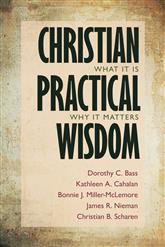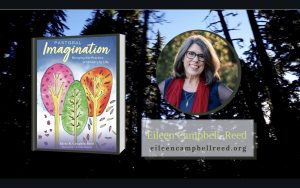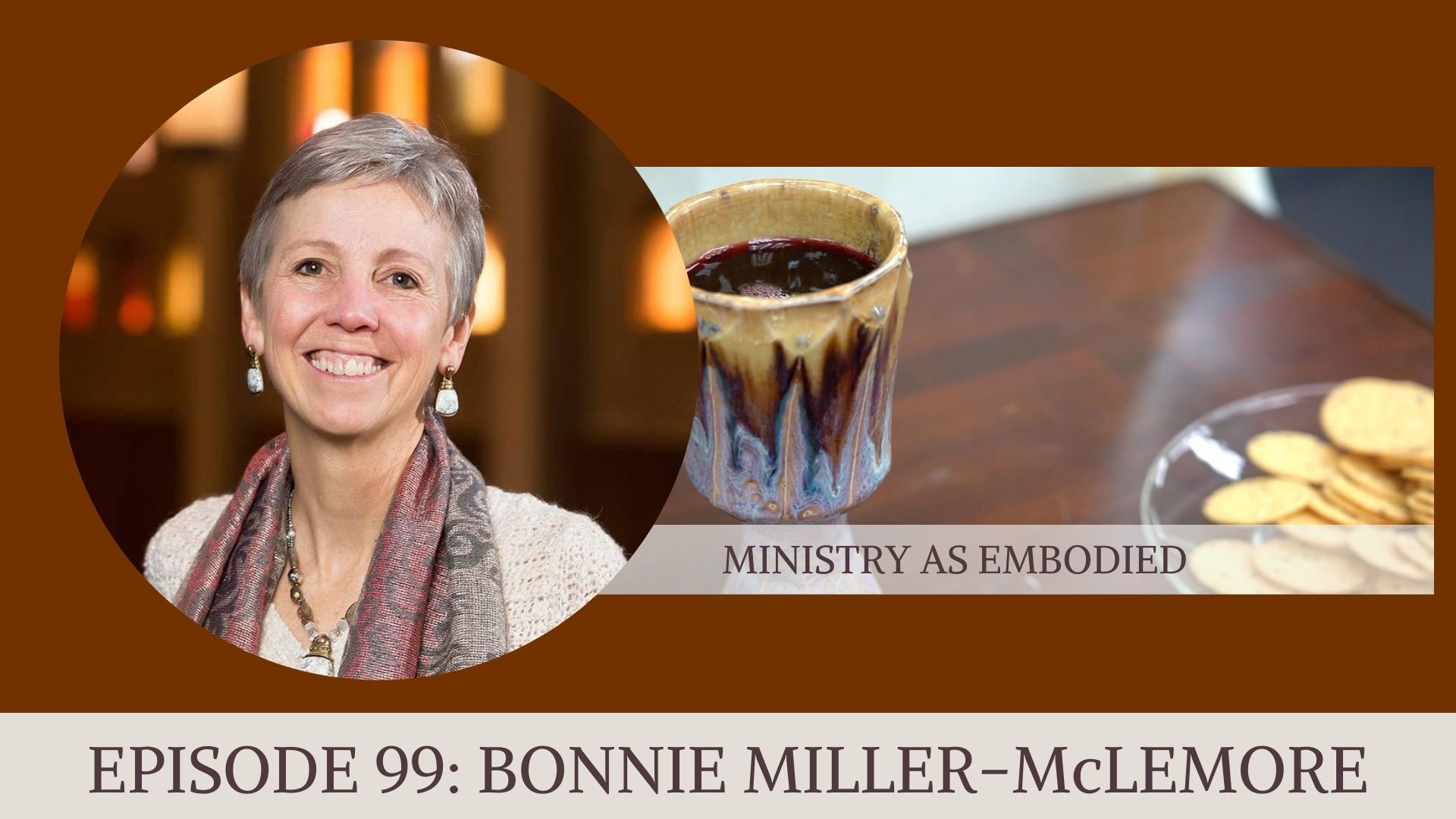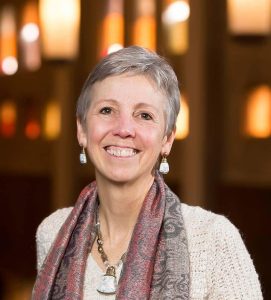Today we are excited to share an author interview focusing on “ministry as embodied” with Dr. Bonnie Miller-McLemore, professor at Vanderbilt Divinity School. She is a senior scholar in pastoral and practical theology, having shaped many important aspects of both fields in the last 25 years. To my good fortune, Bonnie was also my dissertation advisor and mentor in my doctoral program at Vanderbilt. It is never dull to work with Bonnie! And I am deeply grateful for her insights, challenges, guidance and support.
Dr. Bonnie Miller-McLemore is the E. Rhodes and Leona B. Carpenter Professor Emerita of Religion, Psychology, and Culture. She is also Research Professor of Religion, Psychology, and Culture, 2020-2022. She has authored and edited more than 20 books and published scores of journal articles and book chapters. Her work focuses on many urgent and necessary topics for the work of pastoral care, practical theology, and ministry more broadly understood.
 Whether writing about motherhood, death, the influence of feminist thought or the field of practical theology, Bonnie Miller-McLemore never lets the significance of the body out of sight. In her long term collaboration with the Collegeville group, she and Dorothy C. Bass, Kathleen A. Cahalan, James R. Nieman, and Chris Scharen wrote Christian Practical Wisdom: What is it is and Why it Matters.
Whether writing about motherhood, death, the influence of feminist thought or the field of practical theology, Bonnie Miller-McLemore never lets the significance of the body out of sight. In her long term collaboration with the Collegeville group, she and Dorothy C. Bass, Kathleen A. Cahalan, James R. Nieman, and Chris Scharen wrote Christian Practical Wisdom: What is it is and Why it Matters.
In the first chapter of Christian Practical Wisdom, “Spooning: How Bodies Shape Knowledge,” she says, “Our bodies know, our bodies remember, our bodies learn ways to embrace and be embraced by God.” In this chapter Miller-McLemore beautifully explores how we know by body. She considers how sacred and relational knowledge is more than doctrine or rational thinking and is deeply entangled with both.
“Our bodies know, our bodies remember, our bodies learn ways to embrace and be embraced by God.”
—Bonnie J. Miller-McLemore
Ministry as Embodied
Even when we are separated by time, space and a global pandemic, ministry remains a practice that is embodied. We cannot just think about it. Ministry is not merely a set of technical skills. Ministry is a relational, emotional, embodied and integrated practice. And how we know and what we know about the complex work of ministry, becomes sedimented in our flesh and bones. What we think of as intuition can be a matter of what we know “by body.” Thus the resource we invite you to explore is Christian Practical Wisdom.
In this video, I share a story about Malinda, a participant in the Learning Pastoral Imagination Project. Her Clinical Pastoral Education supervisor teaches her the importance of attending to the embodied aspects of ministry. For example, he says, when doing pastoral care with a family who has a new baby, hold the baby.
3MMM | Episode 7: Ministry as Embodied from Eileen Campbell-Reed on Vimeo.
More on Ministry As Embodied | video | blog | podcast
Learning in Practice with Bonnie Miller-McLemore
We asked Bonnie Miller -McLemore questions about her ministry of teaching and writing. She was able to take time to answer because she is currently in a new academic role that allows her time to focus on research and writing. She generously shared questions that interest her. And others questions present “big and pressing” challenges. She also reflects on how the pandemic is pressuring and exhausting us with its lack of embodied connections. Finally she shares what is on her reading list, and it is
What questions do you live by?
BMM: Not sure I live by questions, honestly. But if I had to put my life into this framework, I suppose the primary question, daily and more broadly, runs something like: to what am I called? What are my gifts and passions and whom and what can I serve with them? How does my vocation with family and friends fit with my vocation in the wider world? I have also loved connecting with others around these questions. I love hearing people deliberate about their life callings. And I’m interested in unsettling conventional assumptions about calling. Calling is tough. Living our callings doesn’t come easily to most of us. How do we deal with that?
What questions do you wrestle with in your practice of ministry?
BMM: Right now, I’m most compelled by the cry of the earth and cries of people subjugated by the multi-century reign of white supremacy. These cries raise big and pressing questions for embodied ministry. How do we unsettle fears that drive racist ideologies and everyday bodily practices? And why have humans had such bodily disregard for the earth?
What have people in my own disciplinary corner–pastoral and practical theology–said and done in response to these cries? What should we be saying? The earth is perhaps my last front for exploring embodiment. How has Christianity contributed to the denial of the intelligence of the earth and its non-human inhabitants and how might Christianity foster change?
The video we would like to connect to your voice in ministry is Ministry as Embodied. How do you see embodied ministry happening, even in these days of social distancing and “pandemic pastoring“?
BMM: Best to start by admitting the harsh reality: embodied ministry is taking a big hit these days with masks and distancing.
If we’ve learned anything, it’s how much we are embodied animals that hunger and need to be with others fully, in body and in person. Physical contact is primary to our wellbeing. We need to touch. And we need to see the faces and expressions of those we greet and care for. We need to be in proximity and community with others. I experience this when I see children out and about and cannot let them know I’m smiling behind my mask and that I think they’re wonderful. And I miss partaking of bread and wine around the communion table with people right beside me.
In the meantime, we can celebrate technology as a means for holding us together. All sorts of new ways of connecting have arisen, thanks to video apps.
++++++++++
BMM: And we can identify places where the needs of embodied ministry arise. Let me flag three of them:
- One of the biggest challenges and opportunities right now is learning how to live well in heightened solitude and with those few people in our COVID bubbles. How do we continue to care for others and ourselves within close confines, especially if we’re living among those for whom it’s hard to care for any number of reasons? Under COVID, many people are working lots harder than before and with less gratification.
- Community worship raises a second pressing challenge for embodied ministry. Something great is lost when the community cannot gather, despite all the creative ways that worship services have continued. Our theologies are formed and expressed through bodily action in worship (see my “Spooning: How Bodies Shape Knowledge”). Now, we’re sitting on couches or doing laundry while watching services on laptops. How will communities move back into real embodied worship as we look forward?
- Finally, what about the bodily grief of illness and death? How do we minister in the midst of loss on such a major scale and sometimes at great distance? Simply acknowledging the embodied challenges that we face is a step in the right direction.
How has your practice of ministry changed over time?
BMM: My biggest change of late is moving out of teaching and into a phrased retirement research appointment that allows me to sustain a lot of what I loved about my job (advising, writing, editing, mentoring, and doing stuff like this!) and leave the rest behind.
But overall, my practice of ministry has had more continuity than change. Changes have mostly occurred around the three arenas of academic life–research, teaching, and service. I discovered early on that I could seldom do all three well while also sustaining a family with three children. So my practice of ministry changed as one of these three rose up and demanded my attention and love, whether getting writing done, leading academic societies, or contributing to my school and students. A constant beneath all of this, I suppose, is my love for writing (as much as I have also hated it at times!) and my love for my kids, spouse, and wider family as primary callings.
What is on your must-read list right now?
Books that changed my life in the past year or so include
- Richard Powers, Overstory (I write about this in “Trees and the Unthought Known: The Wisdom of the Nonhuman”)
- Amitav Ghosh, The Great Derangement (I write about this in “‘This is My Body’: Christian Wisdom on Dying in an Age of Denial” forthcoming in Practical Theology)
- Mark Wallace, When God Was a Bird
- and Wilson Dickinson, The Green Good News
Lots of my must-read books are on environment and race, and many of these books lie outside theology and include novels: so, for example, on race, Jesmyn Ward (Where the Line Bleeds), James McBride (Deacon King Kong), Viet Thanh Nguyen (The Sympathizer), and Carolina de Robertis (Cantoras); and on climate, novels by Jenny Offill (Weather) and Charlotte McConaghy (Migrations).
++++++++++++
 “Ministry as Embodied” is the topic of one of fifty chapters of Eileen’s forthcoming book, Pastoral Imagination: Bringing the Practice of Ministry to Life . Pre-orders are open now!
“Ministry as Embodied” is the topic of one of fifty chapters of Eileen’s forthcoming book, Pastoral Imagination: Bringing the Practice of Ministry to Life . Pre-orders are open now!
We are working on a special opportunity for you to order both Pastoral Imagination and its companion journal. Announcement coming soon!
Remember we want to support you as you pay attention to the embodied character of your practice of ministry. The integration of who you are, what you do, and how you move in the world is crucial for cultivating pastoral imagination!





